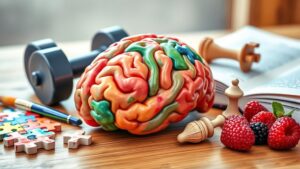Keeping your mind sharp doesn’t have to feel like a chore—it’s about mixing fun with purpose. Try puzzles or card games to challenge your brain and speed up contemplation. Pick up books outside your usual taste to spark creativity and learn something new. Use your senses by cooking or listening to music, which can sharpen memory. Sit quietly for a few minutes daily to clear mental clutter. Stay active and social, because moving and connecting with others keeps your brain engaged. Curious how small changes can make a big difference?
Engage in Mental Challenges and Games
Keeping your mind sharp doesn’t have to feel like a chore—it can actually be fun. Brain exercises to help boost cognitive function are as simple as engaging in crossword puzzles or playing card games. These activities challenge your brain, improving memory and mental agility.
Try Sudoku for logic skills or jigsaw puzzles to sharpen visuospatial reasoning. Card games like bridge or gin rummy push your processing speed and memory while keeping things social.
Even learning new skills, like a musical instrument, fires up different parts of your brain. The key is consistency—make these games part of your routine. You’ll notice quicker cognition and better focus over time.
Plus, it’s a great way to unwind while giving your brain the workout it craves.
Read Diverse Books and Materials
Reading different types of books stretches your mind and helps you reflect in new ways.
You’ll pick up fresh ideas and words, making it easier to solve problems and stay sharp.
Plus, mixing up genres keeps your brain engaged and ready to learn.
Expand Knowledge Horizons
Ever contemplated how diving into different kinds of books could sharpen your mind? Reading diverse subjects—fiction, science, history—fuels your brain health by challenging cognitive functioning and improving memory.
As you investigate new topics, you’re not just learning new skills; you’re also boosting cognitive flexibility, which helps you adapt to fresh ideas. Fictional stories enrich your imagination, while non-fiction expands your learning, keeping your mind agile.
Regularly engaging with varied content lowers the risk of cognitive decline, as your brain stays active and engaged.
Swap out your usual reads for something unfamiliar—try a memoir, a science journal, or a novel from another culture. Each page turns into a workout for your mind, keeping it sharp and curious.
Boost Cognitive Flexibility
Should you be looking to keep your mind nimble, diving into different books and materials can stretch your thoughts like a mental workout.
Reading diverse genres—fiction, history, or science—challenges your brain to adapt, improving cognitive flexibility and boosting learning skills. At the time you engage with unfamiliar topics, it sparks new neural connections, keeping your mental agility sharp.
Don’t stick to one type of book; mixing it up strengthens critical reflection and empathy. Fiction, for example, helps you visualize worlds and characters, enhancing creativity. Nonfiction expands your knowledge base, training your brain to process new ideas faster.
Over time, this habit will improve your overall cognitive function, making it easier to tackle complex problems. The more you read, the more adaptable your mind becomes—so grab a fresh book today!
Incorporate Multisensory Activities
Because your brain thrives on variety, engaging multiple senses at once—like smelling fresh herbs while chopping vegetables or feeling soil between your fingers in the garden—can give your mind a powerful boost.
Multisensory activities help keep your memory sharp by forcing your brain to process information in new ways. Whenever you engage all five senses, you’re not just learning something new; you’re strengthening cognitive fitness.
Try cooking a dish with bold flavors, attending a food festival, or painting with textured materials—each offers a unique benefit for brain health. Even simple tasks, like kneading dough or listening to music while walking, can improve overall mental clarity.
The more senses you involve, the more your brain stays active and alert.
Practice Daily Meditation
Just as engaging your senses keeps your mind active, taking time to quiet your thoughts can sharpen it even further.
Daily meditation helps reduce stress, which often leads to memory problems, and it calms your body, creating a clearer mental state. Even five minutes a day can boost cognitive performance, making daily tasks feel easier. By focusing on your breath or a mantra, you strengthen multiple cognitive abilities, like attention and working memory.
Over time, this practice supports overall well-being by lowering anxiety and improving clarity. Consider it as a mental reset—like hitting pause on chaos—so you can tackle challenges with a sharper, more resilient mind.
Start small, stay consistent, and watch how your focus and calm grow.
Learn New Skills Continuously
One of the best ways to keep your brain sharp is by learning new skills regularly. As you learn a new skill, like playing an instrument or speaking another language, you activate brain cells and boost cognitive processes. This mental stimulation helps improve your concentration and strengthens brain connections over time.
Lifelong learning isn’t just about hobbies—it’s a way to build cognitive flexibility, making it easier to adapt to new challenges. Teaching others what you’ve learned deepens your comprehension while giving your brain an extra workout.
The health benefits go beyond just mental sharpness; they include better memory and resilience as you age. Pick something that excites you, whether it’s cooking, coding, or crafts, and watch how your mind thrives.
Maintain Physical and Social Activity
While keeping your brain sharp involves learning new things, it’s just as essential to stay physically and socially active.
Regular aerobic exercise, like brisk walking or swimming, boosts blood flow to your brain, supporting cognitive health and mental stimulation. Physical activity isn’t just about fitness—it challenges your brain by engaging all five senses, whether you’re dancing or hiking.
Social activities, like joining a book club or volunteering, also play a key role. They keep you connected and mentally sharp, reducing the risk of cognitive decline.
Even simple things, like chatting with friends or playing team sports, strengthen overall brain health. Mixing movement with social interaction creates a powerful combo for your mind, so find activities you enjoy and make them part of your routine.





